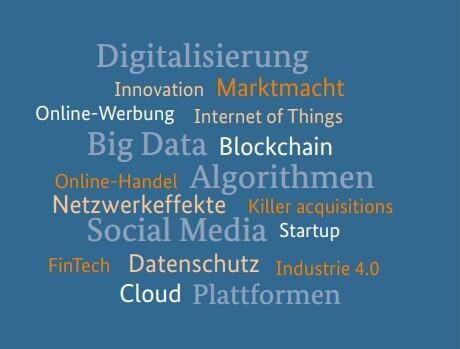Digital markets
How the digital economy works
Digital transformation has a profound impact on almost all sectors of the economy. It has created completely new business models such as search engines, comparison websites, social networks and many business models of the sharing economy. At the same time, digitalisation is changing many traditional sectors, too. This poses new challenges for competition and for the Bundeskartellamt in its work as an enforcer of competition law.

The key feature of many digital markets are platforms and networks facilitating interactions between user groups, for example between buyers and sellers or advertisers and recipients. The phenomenon of users attracting other users, known as positive network effects, plays an important role. Many digital markets have a tendency towards concentration or are already dominated by only a few big players. In some cases, digital ecosystems develop that link different services across markets. It is often difficult for users to switch from one service to another (lock-in effects). Data are also often relevant to competition in the digital economy. They form the basis for many services that are offered free of charge. Data collected on users can, for example, be used for personalised advertising. It is not only in this context that algorithms can be highly relevant when it comes to analysing large amounts of data (big data). Algorithms are the technical basis of many digital business models.
Platforms and networks
Many online services are provided as platforms or networks. They rely heavily on their so-called network effects. Users often prefer services which are already used by many other people. Individual users may profit from a growing number of users connecting with each other. This is referred to as direct network effects. Establishing a connection between different market sides (such as sellers and buyers) is of great importance on online platforms. Buyers may profit from a larger number of sellers and vice versa. This is referred to as indirect network effects.
Services offered free of charge
Many online services are offered free of charge. However, this is only part of the picture. In fact, users often “pay” for these services by sharing their data. In addition, platforms are aimed at several market sides, each of which is subject to a different pricing model: retailers or hotels, for example, that want to be found on and transact their business via a platform often have to pay a fee or commission even if other users can use this service free of charge.
Data are power
Collecting data is the central building block of many digital business models (big data). Companies process large data volumes, for example in order to offer digital services or in the context of presenting adverts. Data are also the key to market power in the digital economy: companies that have access to large volumes of data and can combine data from different sources are usually able to provide better services and enjoy a competitive advantage.
Digital ecosystems
A system of different digital services or products interacting with one another offered by a large digital company is sometimes referred to as a digital ecosystem. It is often less attractive for users to use services outside the ecosystem, for example because the ecosystem’s components are very well integrated. Companies often try to expand their ecosystem (for example, by merging with other companies) or to improve service integration and synergies. Digital ecosystems can sometimes raise competition concerns. For example, a company might deliberately create obstacles that make it more difficult for consumers to switch to alternative providers which may actually be better for them.
Rapid technological developments
New technologies are developing rapidly in the digital economy. Examples include blockchain or the metaverse (a virtual, extended replication of the real world). Most notably, artificial intelligence (AI) is a key technology when it comes to competition in the further development of the digital economy. On the one hand, AI provides opportunities to stimulate competition, but on the other hand, there is the risk of the large internet companies further consolidating their positions of power. The new forms of generative AI are said to possess a disruptive potential similar to the introduction of the smartphone, for example. Although there are promising models from smaller start-ups, large digital companies can increasingly benefit from existing advantages, such as access to data and computing power, when and by developing such models. Data-driven network effects in particular can intensify as AI opens up new possibilities for processing data and linking them in new ways. This can increase the market power of the large players. Competition authorities around the world are therefore also keeping a close eye on the developments in this area.



